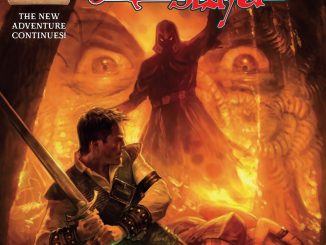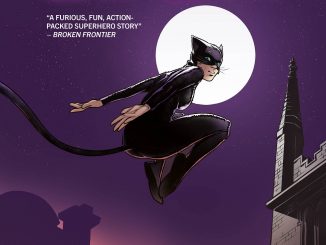Being an Unreliable Opinion-Dump on the Topic of Digital Comics
Cy Dethan is an extremly talented writer, and he has allowed me to review his titles The Indifference Engine: A Holographic Novel, Slaughtermans Creed & Cancertown All of which I have enjoyed immensely and would read time and again. I have heard him described as the next Garth Ennis and one of the best new writers.
What follows is an ‘opinion dump’ on digital comics that Cy was good enough to provide. I would like to invite anyone who is interested in this medium to contact me through the contact page!

There’s a rule among magicians, one that is circulated in teaching materials and lectures around the world. It is recited with quasi-religious reverence at conventions, in magic shops and wherever magic enthusiasts or professionals puddle together. It’s a simple rule, but it speaks volumes about the people who follow it as an ethical guideline or use it as a weapon. Simply put, you must never perform magic in another magician’s professional territory.
Superficially, the rule has a worthy foundation. The idea is that it is poor form to stand in the foyer of a theatre where a pro is working that night and run through your personal repertoire of hackneyed card tricks. It’s disrespectful to the working pro and cheapens the event for the audience. There’s a certain sense to it, but it’s something I’ve never felt entirely comfortable preaching. It’s not the rule itself, exactly, so much as the unspoken assumption among many of its proponents that there is something genetically inferior about performing magic on a smaller stage, or even purely for love of the art, rather than following a more traditional path.
So yeah, bear with me a second while I either wrestle this unwieldy metaphor to the ground to talk about comics, or simply stack it into a tree and try my best not to get tangled in the wreckage.
In creating independent comics we’re all very obviously busking in the foyer of the major publishers. Some are actively hoping to make it onto the largest stages themselves, working with characters and settings they’ve grown up on, while others prefer to tell their own stories without the style guides and plot bibles the big leagues sometimes require. Both choices are completely valid, and don’t even need to be mutually exclusive, but I can’t count the number of times I’ve been asked which major franchise character it’s my dream to work on, as if big-two work for hire were the only measure of success worth pursuing.
The growth of digital and web-based comics has removed a barrier for many creators, and there’s suddenly a Hell of a lot more space in that foyer than all the stages in the industry could ever offer. Those traditional routes to publication, so often seen to be populated by layers of people whose only job is to say no to you because the moment they say yes they’re risking somebody’s money, are no longer the only option for creators with a story to tell. They’re not even necessarily the most desirable.
The responsibility for independent creators has always been to prove that we’re doing more than cheapening the event for the audience. The sudden evaporation of barriers and gatekeepers that digital publication offers needs to be more than just an opportunity to be seen; more than ever, it’s vital now that we be demonstrably worth seeing. That could mean serving readers who aren’t being better catered to in the big leagues, or even taking the majors on at their own game and showing that there’s quality beyond their well guarded borders.
Whatever route individual creators take or goals they pursue, the comics industry seems suddenly to be a much more vibrant and diverse place than it’s been in a while. Digital comics have a central role for creators at every level, from first timer web-strip authors to the biggest names in the business. It’s getting hectic out here in the foyer and, at least by comparison, those big stages are looking smaller all the time.




